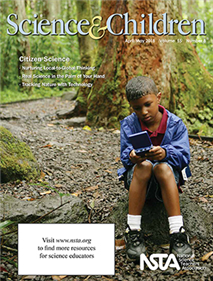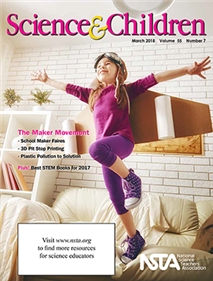All Phenomena resources
NSTA Press Book
Uncovering Student Ideas in Science, Volume 1, Second Edition: 25 Formative Assessment Probes
This is the new updated edition of the first book in the bestselling Uncovering Student Ideas in Science series. Like the first edition of volume 1, this book helps pinpoint what your students know (or think they know) so you can monitor their learni...
By Page Keeley
Journal Article
The Early Years: Introducing Children to Phenology
This column discusses resources and science topics related to students in grades preK to 2. This issue shares an activity meant to provide children with the experiences of collecting data by making observations in nature over time and connecting with...
Journal Article
This column shares exercises to challenge content knowledge. This issue presents a new challenge and answers the A Faucet Phenomenon challenge from last month....
Book Chapter
The purpose of this assessment probe is to elicit students’ ideas about conservation of matter. The probe is designed to reveal whether students think weight is conserved when a whole object is broken up into small pieces. The probe is provided in ...
NSTA Press Book
A Head Start on Life Science: Encouraging a Sense of Wonder
Nurture curiosity and even joy in the youngest scientists. The 24 inquiry-based lessons in this lively collection show you how. The activities are organized into sections on animals, plants, and nature walks. Rather than merely presenting science fac...
By William Straits
Journal Article
Second graders turn knowledge into action as they engineer solutions for a real-world problem in a school makerspace....
Journal Article
Science 102: A Faucet Phenomenon
This column shares exercises to challenge content knowledge. This issue presents a new challenge and answers the Tricky Numbers challenge from last month....
Blog Post
Seeds of Science, Roots of Reading Program Helps Students Develop Explanations
The Next Generation Science Standards (NGSS) encourage three-dimensional thinking in students. 3-D thinking, and the process of developing scientific explanations, are curiosity-driven: They involve wondering, posing questions, and making observation...
By Jim McDonald
Blog Post
Why Don’t Antibiotics Work Like They Used To?
Why don’t antibiotics work like they used to? is an NGSS-aligned storyline developed by the Next Generation Science Storylines Project that focuses on natural selection and other mechanisms of evolution. Wayne Wright and I (Holly Hereau) teac...
By Holly Hereau and Wayne Wright





